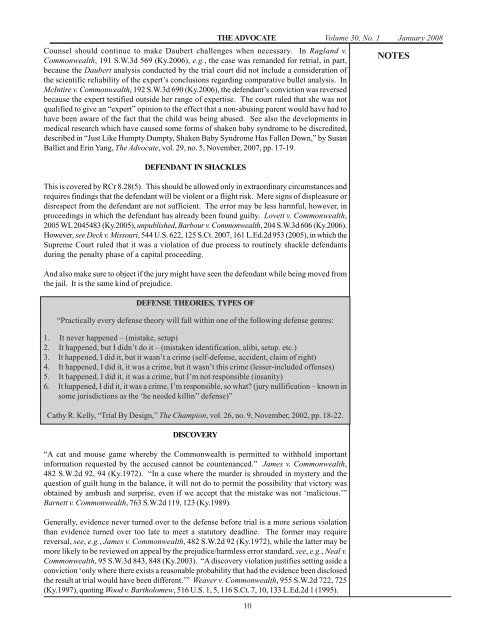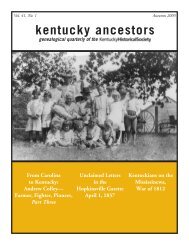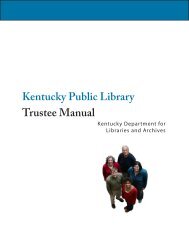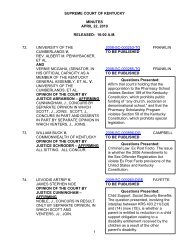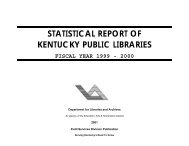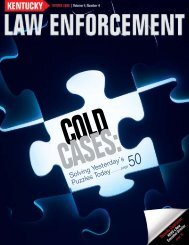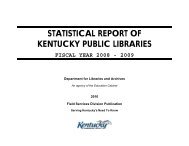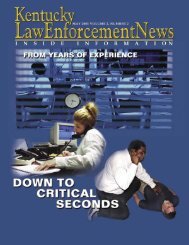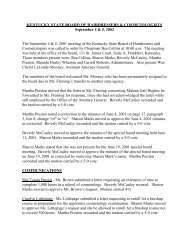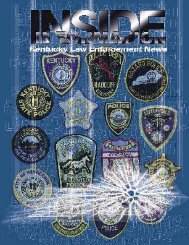Jan08 Advo.pmd - e-archives Home
Jan08 Advo.pmd - e-archives Home
Jan08 Advo.pmd - e-archives Home
You also want an ePaper? Increase the reach of your titles
YUMPU automatically turns print PDFs into web optimized ePapers that Google loves.
THE ADVOCATE Volume 30, No. 1 January 2008<br />
Counsel should continue to make Daubert challenges when necessary. In Ragland v.<br />
Commonwealth, 191 S.W.3d 569 (Ky.2006), e.g., the case was remanded for retrial, in part,<br />
because the Daubert analysis conducted by the trial court did not include a consideration of<br />
the scientific reliability of the expert’s conclusions regarding comparative bullet analysis. In<br />
McIntire v. Commonwealth, 192 S.W.3d 690 (Ky.2006), the defendant’s conviction was reversed<br />
because the expert testified outside her range of expertise. The court ruled that she was not<br />
qualified to give an “expert” opinion to the effect that a non-abusing parent would have had to<br />
have been aware of the fact that the child was being abused. See also the developments in<br />
medical research which have caused some forms of shaken baby syndrome to be discredited,<br />
described in “Just Like Humpty Dumpty, Shaken Baby Syndrome Has Fallen Down,” by Susan<br />
Balliet and Erin Yang, The <strong>Advo</strong>cate, vol. 29, no. 5, November, 2007, pp. 17-19.<br />
DEFENDANT IN SHACKLES<br />
This is covered by RCr 8.28(5). This should be allowed only in extraordinary circumstances and<br />
requires findings that the defendant will be violent or a flight risk. Mere signs of displeasure or<br />
disrespect from the defendant are not sufficient. The error may be less harmful, however, in<br />
proceedings in which the defendant has already been found guilty. Lovett v. Commonwealth,<br />
2005 WL 2045483 (Ky.2005), unpublished, Barbour v. Commonwealth, 204 S.W.3d 606 (Ky.2006).<br />
However, see Deck v. Missouri, 544 U.S. 622, 125 S.Ct. 2007, 161 L.Ed.2d 953 (2005), in which the<br />
Supreme Court ruled that it was a violation of due process to routinely shackle defendants<br />
during the penalty phase of a capital proceeding.<br />
And also make sure to object if the jury might have seen the defendant while being moved from<br />
the jail. It is the same kind of prejudice.<br />
DEFENSE THEORIES, TYPES OF<br />
“Practically every defense theory will fall within one of the following defense genres:<br />
1. It never happened – (mistake, setup)<br />
2. It happened, but I didn’t do it – (mistaken identification, alibi, setup. etc.)<br />
3. It happened, I did it, but it wasn’t a crime (self-defense, accident, claim of right)<br />
4. It happened, I did it, it was a crime, but it wasn’t this crime (lesser-included offenses)<br />
5. It happened, I did it, it was a crime, but I’m not responsible (insanity)<br />
6. It happened, I did it, it was a crime, I’m responsible, so what? (jury nullification – known in<br />
some jurisdictions as the ‘he needed killin’’ defense)”<br />
Cathy R. Kelly, “Trial By Design,” The Champion, vol. 26, no. 9, November, 2002, pp. 18-22.<br />
DISCOVERY<br />
“A cat and mouse game whereby the Commonwealth is permitted to withhold important<br />
information requested by the accused cannot be countenanced.” James v. Commonwealth,<br />
482 S.W.2d 92, 94 (Ky.1972). “In a case where the murder is shrouded in mystery and the<br />
question of guilt hung in the balance, it will not do to permit the possibility that victory was<br />
obtained by ambush and surprise, even if we accept that the mistake was not ‘malicious.’”<br />
Barnett v. Commonwealth, 763 S.W.2d 119, 123 (Ky.1989).<br />
Generally, evidence never turned over to the defense before trial is a more serious violation<br />
than evidence turned over too late to meet a statutory deadline. The former may require<br />
reversal, see, e.g., James v. Commonwealth, 482 S.W.2d 92 (Ky.1972), while the latter may be<br />
more likely to be reviewed on appeal by the prejudice/harmless error standard, see, e.g., Neal v.<br />
Commonwealth, 95 S.W.3d 843, 848 (Ky.2003). “A discovery violation justifies setting aside a<br />
conviction ‘only where there exists a reasonable probability that had the evidence been disclosed<br />
the result at trial would have been different.’” Weaver v. Commonwealth, 955 S.W.2d 722, 725<br />
(Ky.1997), quoting Wood v. Bartholomew, 516 U.S. 1, 5, 116 S.Ct. 7, 10, 133 L.Ed.2d 1 (1995).<br />
10<br />
NOTES


